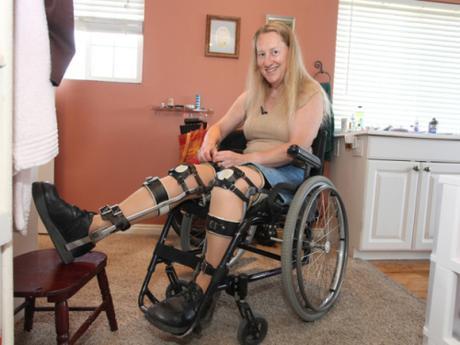Sarah Boesveld reports for Canada’s National Post, June 2, 2015, that as the public are becoming acclimated to transgenders, a new group of trans are also seeking “understanding.”
The new group are the transabled — people whose bodies are in full working order but “feel” like imposters in their bodies and desire to become disabled.
An example is Chloe Jennings-White of Salt Lake City, Utah. She wears leg braces and uses a wheelchair, even though she does not need them because her legs work just fine.

Chloe Jennings-White
Many transabled crave to become physically impaired, be it amputation of a limb, paralysis, blindness, or deafness. Some, like a man who calls himself One Hand Jason, arrange “accidents” to help achieve their goal.
One Hand Jason cut off his right arm with a “very sharp power tool,” but let everyone believe it was an accident. He had for months tried different means of cutting and crushing the limb that never quite felt like his own, training himself on first aid so he wouldn’t bleed to death, even practicing on animal parts sourced from a butcher. “My goal was to get the job done with no hope of reconstruction or re-attachment, and I wanted some method that I could actually bring myself to do,” he told the body modification website ModBlog.
Another transabled deliberately dropped a very heavy concrete block on his legs so that an amputation would be necessary. But doctors saved the leg. The man now limps, although it’s not the disability he wanted.
Researchers in Canada are trying to better understand how transabled people think and feel. Clive Baldwin, a Canada Research Chair in Narrative Studies who teaches social work at St. Thomas University in Fredericton, N.B., has interviewed 37 people worldwide who identify as transabled. Most of them are men; about half are in Germany and Switzerland, with a few in Canada.
Baldwin says the transabled are very secretive and often keep their desires to themselves. One 78-year-old man told Baldwin he’d lived with the secret for 60 years and never told his wife. Some of Baldwin’s study participants compare their transabledness to the experience many transgender people express of not feeling like they’re in the right body. Baldwin says this disorder is starting to be thought of as a neurological problem with the body’s mapping, rather than a mental illness.
Baldwin suggests transabledness is just another form of body diversity — like transgenderism — and amputation may help someone achieve similar goals as someone who, say, undergoes cosmetic surgery to look more like who they believe their ideal selves to be.
In fact, in the late 1990s, Scottish surgeon Dr. Robert Smith amputated the legs of two patients at their request. While the surgery involved National Health Service staff, each patient paid nearly $6,000 for their procedures.

Alexandre Baril
Alexandre Baril, a visiting scholar of feminist, gender and sexuality studies at Wesleyan University in Middletown, Connecticut, who is himself disabled and transgender, says, “We define transability as the desire or the need for a person identified as able-bodied by other people to transform his or her body to obtain a physical impairment.”
Baril decries the prejudice that transgenders and disabled people have for transabled: “They tend to see transabled people as dishonest people, people who try to steal resources from the community, people who would be disrespectful by denying or fetishizing or romanticizing disability reality. Each try to distance themselves.”
The American Psychiatric Association calls transability a Body Integrity Identity Disorder, and recently added it to the “emerging measures and models” appendix section of the association’s classification and diagnostic tool, the DSM-5 (Diagnostic and Statistical Manual of Mental Disorders, Fifth Edition).
Not that long ago, the AMA had also identified transgenderism to be a body dysmorphic disorder, like anorexia nervosa — a disordered belief that one’s physical appearance is unusually defective and worthy of being hidden or altered through surgery. As transability increasingly is publicized — and politicized — no doubt the AMA will suddenly become “enlightened” and remove transability as a disorder.
Before you know it, unnecessary surgery to amputate perfectly healthy limbs will be covered by Medicare, as transgender surgery now is.
~Éowyn

